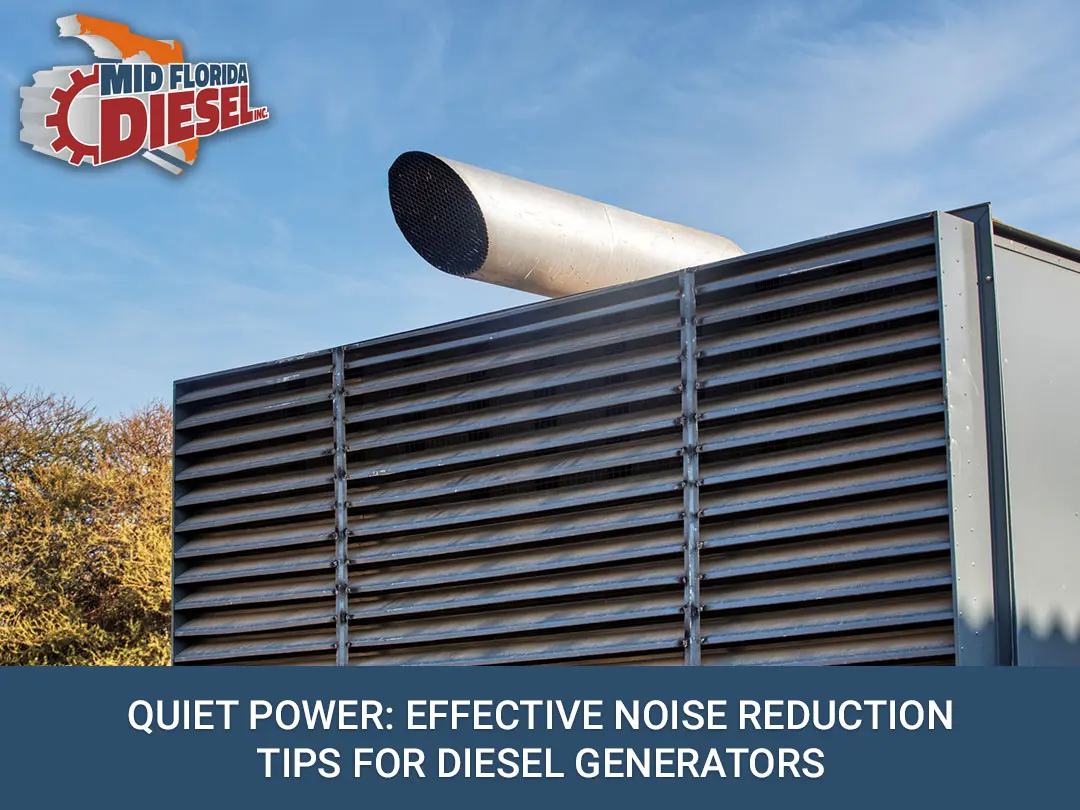
Understanding the challenge of generator noise
Diesel generators are widely used across Florida for backup power, outdoor events, and commercial operations. While reliable and durable, they can produce noticeable noise that affects both comfort and compliance with local sound regulations. Whether running a residential backup system or operating equipment on a construction site, controlling generator sound levels creates a more comfortable and neighbor-friendly environment.
Noise from diesel engines originates from several sources, including mechanical vibration, exhaust flow, and air movement through the cooling system. Each factor contributes to the overall sound level, which can reach volumes comparable to those of heavy traffic. Understanding these sources is the first step toward reducing unwanted noise without diminishing generator performance.
Proper placement for quieter operation
The location of the generator is crucial for controlling its sound. Placing the generator on a stable, level surface, away from where people live or work, can immediately reduce the noise level. Sound is reflected off hard surfaces, such as concrete, but grass or gravel surfaces help absorb it. Putting the unit behind a wall or a line of shrubs or another natural barrier also reduces noise transmission.
In Florida, where storms and high humidity are common, generators are often run outside. The best placement strikes a balance between distance and ventilation. To prevent the generator from overheating and to ensure proper airflow, keep it at least a few feet away from walls or other obstructions.
Soundproof enclosures and barriers
Acoustic enclosures are one of the most effective methods for reducing noise. These enclosures are made with materials that absorb sound, which stops sound waves and dampens vibration. There are various levels of sound attenuation available for commercial units, allowing owners to select an enclosure that meets their specific needs and the noise standards in their area.
Sound barriers can be used instead for bigger jobs or open job sites. You can set up temporary panels made of acoustic foam or fiberglass insulation around the generator to redirect and absorb the sound. The material’s height, distance, and density all affect its performance.
Regular maintenance reduces mechanical noise
A well-maintained generator naturally runs more quietly. Loose parts, worn bearings, and clogged filters all contribute to shaking and increased noise. Regular inspections ensure that each part functions correctly and that minor issues don’t escalate into larger mechanical problems.
Preventive maintenance includes changing the oil, cleaning the exhaust system, and inspecting the rubber mounts. Replacing old insulation or sealing worn gaskets can also significantly improve sound control. Many Florida homeowners hire professionals to keep their homes running smoothly and quietly.
Mufflers and exhaust modifications
Another significant source of generator noise is the exhaust system. Installing a high-quality muffler specifically designed for diesel engines can significantly reduce exhaust noise while maintaining optimal airflow. There are reactive, absorptive, and combination mufflers, each made to handle a different range of frequencies.
For businesses or factories, custom exhaust routing can direct noise away from populated areas, thereby reducing noise pollution. When used with the proper insulation, these changes can create a more efficient and quieter power solution.
Vibration control and isolation techniques
The engine and alternator of the generator can vibrate, causing sound waves to be transmitted to nearby surfaces, which in turn amplifies the sound. Placing the unit on vibration isolators or rubber pads reduces this effect. These mounts absorb mechanical energy, preventing it from transferring through the ground or floor.
If you want to create a permanent installation, building a small concrete base with vibration pads incorporated will make it more stable and quieter. Even small changes to vibration control can make a significant difference in noise levels when the machine is in continuous operation.
Frequently Asked Questions
Can I build my own soundproof enclosure?
Yes, but you need to plan it out carefully so that it receives enough air. If airflow is limited, there is a chance of overheating. Professional enclosures are designed to maintain both coolness and quietness simultaneously.
How often should I maintain my diesel generator to reduce noise?
You should conduct maintenance every six months or once you’ve reached the recommended operating hours. Regular inspections keep parts clean and in excellent working condition, reducing vibration and mechanical noise.
Do mufflers affect generator performance?
No, when they are fitted correctly, they enhance the sound quality without compromising efficiency. Using parts that the manufacturer has approved ensures that everything works together seamlessly and that the airflow remains consistent.
What is the acceptable noise level for generators in Florida?
Different counties have different rules, but most residential areas require noise levels to be below 70 decibels while the machine is running. Always check the local laws before installing any equipment.
Managing generator noise improves comfort and compliance while maintaining reliable power. Through careful placement, regular maintenance, and the use of sound-absorbing materials, diesel generators can operate efficiently without disrupting nearby environments. Property owners across Florida can create quieter, more effective setups by combining professional expertise with consistent upkeep. For expert maintenance, installation, and noise-reduction solutions, contact Mid Florida Diesel.
Picture Credit: iStock
